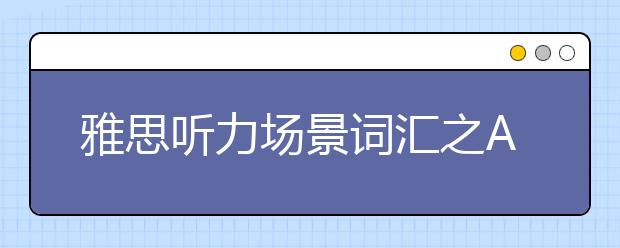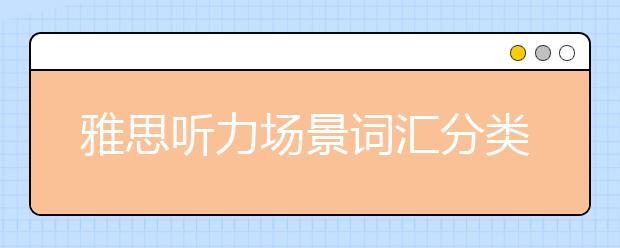当前城市:淄博[切换]
- 手机雅思无忧

扫码登录
雅思考试主要是通过对考生听、说、读、写四个方面英语能力的考核,综合测评考生的英语沟通运用能力,实现“沟通为本”的考试理念。对于雅思考生来说,也有很多考试难点和政策盲区需要帮助解答。今天雅思无忧网小编准备了雅思听力真题accommodation 雅思听力要记住的必备词汇,希望通过文章来解决雅思考生这方面的疑难问题,敬请关注。
part 1
基本信息题
1 Name
What’s your full name?
What name do people at home call you?
Does your name have any special meaning?
Would you like to change your name?
Do Chinese people attach a lot of importance to names?
2 Hometown
What do you like about your hometown?
Did you learn much about the history about your hometown?
Has the weather in your hometown changed much in recent years?
What facilities does your hometown have?
3 Accommodation
Can you describe the place where you live?
Please describe the room you live in.
Are the transport facilities near your home very good?
How well do you know your neighbors?
Would you say the place where you live is good for families with children?
4 Work/Study
Do you work or are you a student?
What is your favorite subject at school?
What is your future work plan?
What do you like about your work?
5 Shoe
What kind of shoes do you like?
Where do you shop for shoes?
Do you prefer comfortable shoes or pretty shoes?
6 Friend
Do you have many close friends?
What do you usually do with your friends?
How long have you known your best friend?
7 Food/Fruits
Do you think there are any benefits from eating breakfast?
What do you consider to be a healthy diet?
Are you willing to try some new food?
What’s your favorite fruit?
8 Laughing
When would people usually laugh?
Do you enjoy laughing?
Is laughing beneficial to health?
9 Handwriting
Do you prefer handwriting or typing?
Will handwriting be replaced by typing in the future?
10 Nature
Do you enjoy nature?
What could people do to protect our natural environment?
11 Camping
Do you like camping?
Have you ever had camping experience before?
Is camping very popular in your country?
技能类
12 Cars
Do you like cars?
Do you have a driver’s license?
If you wanted to buy a car, what kind of car would you choose?
Do you like travelling by car?
13 Languages
What foreign languages have you studied?
Do Chinese people have many opportunities to practice oral English?
What is the most difficult part about studying a foreign language?
14 Dictionary
Do you often use dictionary?
What kind of dictionary do you prefer to use?
What are the benefits of using dictionaries for kids?
15 Map
Do you use maps?
Do you think map is important?
Do you prefer to use electronic maps or those made of paper?
高频题(喜好,偏向类居多)
16 Noise
Are you often bothered by noise?
What natural sounds do you like the most?
What are some places where there is a lot of noise?
17 Street Market
Do you like visiting street market?
What is usually sold in these street markets?
Would you like to visit a street market in a foreign country?
Do people in your country prefer to shop at a street market or in normal malls?
18 Shopping
Do you like shopping?
Is there anything you don’t like about shopping?
Do you enjoy shopping alone or with others?
19 On-Line Shopping
Do you like shopping on line?
What are the benefits of shopping on line?
20 Housework
Do you usually do any housework?
Do you think it’s important for children to do some housework?
21 TV
What kind of TV program do you like to watch?
What kind of TV program is popular in China?
How do you feel about advertisements on TV?
22 Color
What’s your favorite color?
Do you usually wear clothes in your favorite color?
Do you think color is important in our daily life?
Are there any colors you dislike?
23 Concentration
Is it easy to concentrate on things?
How to make children concentrate on things?
24 Reading
Do you like reading?
Do you like reading in the morning or in the afternoon?
What kind of books do you like to read?
25 Cycling
Do you like riding bicycles?
Are bicycles very popular in China?
What are the benefits of riding bicycles?
26 Birthday
What do you usually do on your birthdays?
What do Chinese people usually do on their birthdays?
Is birthday still important to you?
27 Teachers
Do you like your teachers?
What do you think of your teachers?
When you were in school, did your teacher have an influence on you?
What qualities should a good teacher have?
28 Politeness
Is being polite very important?
Who taught you to be polite?
29 Time Management
Do you often wear a watch?
Is being on time important?
How do you feel when others are late?
30 Toy
What kind of toy did you like to play when you were little?
Are there any differences between the toys today and toys in the past?
Why are some *s still keeping their childhood toys?
写作
以上为04年1月至11月的雅思作文TASK1的题型出现的频率,由此可见,柱形图以及表格图出现的频率是最高的,均为17次;;而饼图、线图以及前几年并不常常出现的流程图并列第二,出现的次数为6次;地图以及混合图到目前为止出现的频率最低,只有4次
因此,从数量上来分析,已经遥遥领先的柱形图和表格图出现的机率可能降低,然而并列第二中的两种图形即饼图以及线图则在接下来一个多月的考试中很有可能再次出现,混合图以及地图出也需要考生好好准备,切勿掉以轻心。
TASK2
展示一下2021年主要出现频率,14年最后的几场考试中大作文考生们可以重点准备传媒类、文化和环境类的内容和语料,其次是社会和教育类。
建议准备如下题目:
1. We have a population with a mix of cultures and ethnics in a country. Why is this the case?And has this become a positive or negative development?(文化类)
2. Some people think we should invent a new language that can be used by people all over the world for international communication. Do you think its benefits would outweigh the problems?(文化类)
3. Some people believe that news media is influencing people’s lives and just brings negative effects today. To what extent do you agree or disagree?(传媒类)
4. Newspapers have great influence on people’s opinions and ideas. What are the reasons of the phenomenon and *yze the positive and negative effects of the phenomenon.(传媒类)
5. Many people believe that scientific research should be carried out and controlled by governments rather than private companies. To what extent do you agree or disagree?(*类)
6. Some people think that individuals are not able improve the environment, only government and companies can make a difference. To what extent do you agree or disagree?(*类)
7. In some countries, it is possible for people to have a variety of food that has been transported from all over the world. To what extent do you think its benefits outweigh the drawbacks? (社会现象类)
8. People nowadays are living in societies where consumer goods are relatively cheaper to buy. Do you think the advantages outweigh the disadvantages? (社会现象类)
9. Recently, children are spending much time on TV instead of active and creative things, why do you think this is a case? What measures will be helpful to change this problem? (教育类/report)
10. Today, more and more students are choosing to move to other cities to have higher education. Do you think the benefits outweigh the drawbacks? (教育类)
雅思听力有问题的同学大致可以分为两类,一类是知道自己听力很差,所以题目做不对;另一类是感觉听力不差,都能听懂,但是题目还是做不对。符合第一类情况的同学直接提高听力就好。属于第二类情况的同学往往就比较迷茫,不知道该往哪里使劲好。下面我就给大家分析一下!
雅思听力能听懂,可就是做不对怎么办
仔细分析一下,出现第二种情况的原因就两个:
1. 题目没读懂。
2. 听懂了 句子 ,没听懂段子。
原因一 | 听力题目没读懂
我们通常会认为如果听力能听懂,题目就一定能做对。其实这里面还隐含了另一个前提,就是题目能看懂。不要小看这个前提。有很多同学之所以听力题目做错,就是在读题时出错。
比如,剑桥雅思的听力题目中有这样一道题:
What did Joanna's subjects say about the audience at a performance?
A. The musician's choice of clothing is linked to respect for the audience.
B. The clothing should not distract the audience from the music.
C. The audience should make the effort to dress appropriately.
一些同学看到 subjects (研究对象)可能会理解为 object (目标,目的)这个词的含义。原本题目问的是「 Joanna 的实验对象针对观看表演的观众发表了什么看法」,可能会被误解为「Joanna 提到观看表演的观众的目的是什么」。整个题目问题理解错了,能否做对就只能看运气了。
其实刚才那道题目理解错,也不全是词汇的锅。如果要表达「Joanna 提到观看表演的观众的目的是什么」,这句话的句型至少是 What 「are 」Joanna's ... 「to say」 about... ? 原句用 「did」和「say」,语法上讲不通。语法基础好的同学应该能一眼看出这么理解有问题。
题目读不懂的问题怎么解决?
雅思听力并不是只考听力。读题其实就是在做阅读。说白了,我们除了要提高听力,还需要在词汇、语法、句子理解等基础能力上进行训练,加强阅读方面的基本功。
原因二 | 听懂了句子,没听懂段子
为什么会出现「自以为听懂」的情况?那是因为有些同学对「听懂」的理解有
偏差。他们认为「听懂」就是能理解每一句听力内容的意思。
实际上,听懂句子只是理解听力内容的一个环节。表面上听懂了每一句话,但是没有听明白整个段子的逻辑脉络,到最后做题依然不会。这个时候,大家直观上会感觉听力考的都是自己没注意到的点,甚至开始埋怨自己笔记没记好。
这个锅笔记可不背。不是没记好笔记导致不会做题,而是只听懂了句子没听懂段子,导致笔记不知道记什么好。最糟糕的是,由于对听力段子的脉络不清楚,导致记笔记没有重点,想要要记的细节太多,来不及记,甚至出现记一句漏听三句的情况。
以下面的一段听力段子为例。
My research investigated the way players see their role as a musian and how this is linked to the type of clothing they decide to wear. But that focus didn't emerge immediately. When I started I was more interested in trying to investigate the impact of what was worn on those listening, and also whether someone like a violinst might adopt a different style of clothing from, say someone playing the flut or the trumpet.
没听懂整个段子的人的笔记可能是这样的:
research: link roles of player to cloth.
focus not emerge immediately.
started with research:
1. impact of cloth on listener (more interest);
2. whether some players adopt different clothing from other players.
听懂了整个段子的人的笔记是可能是这样的:
research: link roles of player to cloth.
←started with research:
1. impact of cloth on listener (more interest);
2. link roles of player to cloth.
第一种笔记试图把每一句话都记下来。显然没有做任何信息的删减和合并,也没有找信息之间的关联。我们乍一看第一种笔记,还会觉得第一行和第二行笔记衔接不上。
第二种笔记去掉了对第二句话的笔记,因为第二句话是承上启下的句子,可以用后面内容来代替。第二种笔记还去掉了对最后一句话的后半句的细节描述,改为跟第一句话一模一样的笔记内容,并且还用了加黑字体把一样的内容标注了出来。
这其实是告诉我们说话者研究的内容的变化趋势,原先更感兴趣的内容舍弃了,保留了之前不那么感兴趣的研究内容。
第二种笔记显然比第一种笔记更简洁明了。在对段子有了真正的理解之后才可能做出来的笔记。有了这样的笔记,我们也就不用担心做题时忘了听力内容。
如何解决「听懂了句子听不懂段子」的问题?
一方面我们需要加强逻辑梳理和概括段落大意方面的训练,另一方面我们还需要学会在听力中理解一些「功能句」。「功能句」包括之前提到的承上启下的句子,以及 其它 表示举例、并列、因果推理、 总结 、先后顺序、意义增补或删减、对比、转折、比较等含义的句子。当然,一些特殊的表达方式也可以起到类似功能句的作用,比如 but, and also, well, OK, now 等等,它们有的表示转折或并列,有的引出新的信息点。这些也是我们需要注意的。
具体训练的时候,我们可以先从阅读中练习逻辑和段落大意总结,再结合听力材料训练对功能句的判断,把握听力段子的叙述套路。这两个根本性问题解决后,才算可以真正听懂听力段子。
雅思听力大小写规范梳理
雅思考试听力大小写问题1)专有名词首字母一定要大写,比如学科名,建筑名,书名,机构名,人名,地址、国家、星球、节日、杂志名、电影名、职位、星期几、月份、特定的称谓等。比如:
人名:Professor John Smith
地名 :Gold Coast(黄金海岸)
月份: September
杂志: Fortune Magazine
雅思考试听力大小写问题2)完整句句首单词首字母一定要大写。
Let life be beautiful like summer flowers,death like autumn leaves.
雅思考试听力大小写问题3)字母和数字在一起时,字母大写。
邮编:RA6 7BU; BH246GL
护照号:AL2880
航班号:AC937
注册会员号:UK765024EG
含有连字符的词计为一个单位。
雅思听力考试里有一些单词一定要连着写,有一些单词还要分开写,另外有一些单词是分开以及连着写都可以,还有的单词需要连字符。这里我们针对这几种情况为大家举例说明一下。
必须连着写的单词,比如:
undersea 海底的
firewood 木柴
timetable 时刻表
footbridge 人行天桥
必须分开写的单词,比如:
eye drop 滴眼剂
photo card 相片卡
window shade 百叶窗
ice rink 溜冰场
side door 侧门
可以连着写,也可以分开写的单词,比如:
show room 或者showroom
day off 或者dayoff
post box或者postbox
green house或者greenhouse
带连字符的单词,比如:
self-discipline 自我约束;
triangle-shaped 三角形的
non-active 不活跃的
well-organized 有序
air-conditioning 空调
雅思听力连字符考点总结
一、连字符可用来连接21-99的复合数词。
在剑桥听力Section1部分中,常会出现数字考点,而一提到数字,出题频率最高的就是年代,钱数,*号码等信息。比如在雅思真题3-8听力文稿中出现过:
eighty-seven percent(87%); nineteen eighty-eight(1988); Two hundred-seven-six-five(200-7-6-5 ‘*号码’)等。
当然在书写这些数字的时候笔者建议直接书写*数字就可以了,即简洁又便于快速记录,而且还可以避免出现单词拼写的错误。
二、当连字符用在数词之间或日期时,它有“到”和“包括”的含义。
连字符书写原则的第2点也是和数字有关,让我们来一起看一看剑桥真题中的例子:
ten-four(10.00-4.00 剑3); three to four thousand words (3000-4000 剑4); sixty to eighty pounds (£60-£80 剑5);
在这里广大考生要注意的问题是介词to和数字2的区别。比如sixty to eighty pounds 很多同学会写成62.80,这就出现了把介词to理解成数字2的错误。带零头的钱数的念法是sixty two pounds eighty, 所以通过分析数字念法,可以辨析出什么时候应该写介词to什么时候意思表示数字2。
三、需要连字符构成复合词。
1.形容词/数词+名词:
例如:*all-scale(剑3);full-time/part-time job(剑5);low-risk investment(剑5);second-year student (剑5);ten-minute walk(剑6);seven-screen cinema (剑7);high-quality (剑7);low-cost cover (剑7);
2.副词+过去分词:
例如:well-equipped gym (剑5);fully-licensed restaurant (剑6);well-qualified (剑7);
3.形容词+名词-ed:
例如:old-fashioned(剑3);two-bedroomed house (剑3);passport-sized (剑3);medium-sized coach (剑5);
4.名词+名词:
例如:beach-netting (剑4);money-lenders (剑6);car-park (剑8);
四、连字符可用于某些前缀与词根之间:
例如:over-lap (剑3);co-operative(剑3);counter-productive(剑3);under-reported(剑4);
五、位于名词之前用作定语的复合修饰语之间,一般应加连字符。
例如:500-year-old tree(剑6);on a one-to-one basis (剑6);face-to-face interviews(剑6);door-to-door service (剑7);up-to-date(剑7);
在这里需要注意的是 短语 door to door和face to face后面加名词的时候起到的是形容词作用,而不加连字符的时候则变成副词成分。请大家体会下面的2个例句:
例句:
1.The two men stood face to face. 用在动词后面,作为副词使用。
2.We need to conduct a couple of face-to-face interviews. 用在名词前,作为形容词使用。
雅思听力填写答案的注意事项
1. 关于大小写:
如果你习惯大写,就全部用大写,这样不会算错
如果你习惯小写,需要注意以下几点首字母大写:
a. 表格里面的内容一般要求大写
b. 特殊名词 比如: 时间(Monday) 地点(Church Road) 人名(John) 职位(Professor)
c. 上下文对应位置大写的也要大写
2.关于缩写
普遍承认的缩写均可使用
a. 1st April =April 1st但是不能写成Apr
b. pound, dollar 建议缩写成符号
c. am pm AD BC都可以写成缩写的形式
d. professor 可以写成pro 但是如果有人名,需要大写成Pro.
e. CD要写成CD player
3.几个容易拼错的词
accommodation,cigarette,cassette,tobacco,oxygen,separate,
Australia,communication,aggregate,aggravate
雅思听力能听懂,可就是做不对怎么办相关 文章 :
★ 雅思听力听不懂怎么办?有技巧补救吗?
★ 毕业八年考雅思G类考生谈经验
★ 雅思听力最大的障碍是词汇听不懂
★ 雅思听力老师提高不了?可能是因为这些问题
★ 你一定要掌握的20个雅思听力技巧
★ 雅思听力怎么攻坚最后的高分阶段?
★ 你一定要掌握的提高雅思英语听力的方法
★ 雅思听力语音障碍
★ 雅思英语|雅思听力考试速度太快跟不上,怎么办?
★ 雅思听力备考的三条建议
以上就是雅思无忧网为您准备的访问雅思无忧网(https://www.yasi.cn/),了解更多雅思考试新消息,新动态。
雅思培训 超全的!2025年全年雅思考试时间表及报名费 雅思小白必备:雅思考试费用与2024时间场次安排
超全的!2025年全年雅思考试时间表及报名费 雅思小白必备:雅思考试费用与2024时间场次安排
超全的!2025年全年雅思考试时间表及报名费2025年全年雅思考试时间表及报名费一、2025年全年雅
2025年11月28日 21:18 雅思小白必备:雅思考试费用与2024时间场次安排(雅思考试时间和费用)
雅思小白必备:雅思考试费用与2024时间场次安排(雅思考试时间和费用)
雅思小白必备:雅思考试费用与2024时间场次安排雅思考试费用与2024年时间场次安排一、雅思考试费用
2025年12月07日 10:16 雅思小白必备:雅思考试费用与2024时间场次安排(超全的!2025年全年雅思考试时间表及报名费)
雅思小白必备:雅思考试费用与2024时间场次安排(超全的!2025年全年雅思考试时间表及报名费)
雅思小白必备:雅思考试费用与2024时间场次安排雅思考试费用与2024年时间场次安排一、雅思考试费用
2025年12月10日 02:22 雅思小白必备:雅思考试费用与2024时间场次安排 最新!雅思报名费又涨了!1-3月雅思考试时间公布!
雅思小白必备:雅思考试费用与2024时间场次安排 最新!雅思报名费又涨了!1-3月雅思考试时间公布!
雅思小白必备:雅思考试费用与2024时间场次安排雅思考试费用与2024年时间场次安排一、雅思考试费用
2025年12月24日 12:40 超全的!2025年全年雅思考试时间表及报名费(雅思小白必备:雅思考试费用与2024时间场次安排)
超全的!2025年全年雅思考试时间表及报名费(雅思小白必备:雅思考试费用与2024时间场次安排)
超全的!2025年全年雅思考试时间表及报名费2025年全年雅思考试时间表及报名费一、2025年全年雅
2025年12月29日 07:09 雅思听力场景词汇之Accommodation
雅思听力场景词汇之Accommodation
在雅思听力考试中,考生对场景词汇的掌握十分重要。今天新东方在线雅思针对考生们在听力考试常用到的Acc
2021年09月28日 11:33 雅思听力场景词汇分类:Accommodation住处
雅思听力场景词汇分类:Accommodation住处
推荐阅读: property 房产 dorm=dormitory
2021年10月18日 11:31 2021年5月雅思口语新题part1:Accommodation
2021年5月雅思口语新题part1:Accommodation
雅思考试主要是通过对考生听、说、读、写四个方面英语能力的考核,综合测评考生的英语沟通运用能力,实现“
2021年07月16日 21:24 2021年1-4月雅思口语题库完整版part1:Accommodation
2021年1-4月雅思口语题库完整版part1:Accommodation
雅思考试主要是通过对考生听、说、读、写四个方面英语能力的考核,综合测评考生的英语沟通运用能力,实现“
2021年07月18日 00:55 2021年5月雅思口语新题part1:Accommodation
2021年5月雅思口语新题part1:Accommodation
雅思考试每年1月、5月、9月都会进行雅思口语换题,备考雅思的小伙伴们肯定想知道本次5月更新了哪些新题
2021年07月30日 14:41